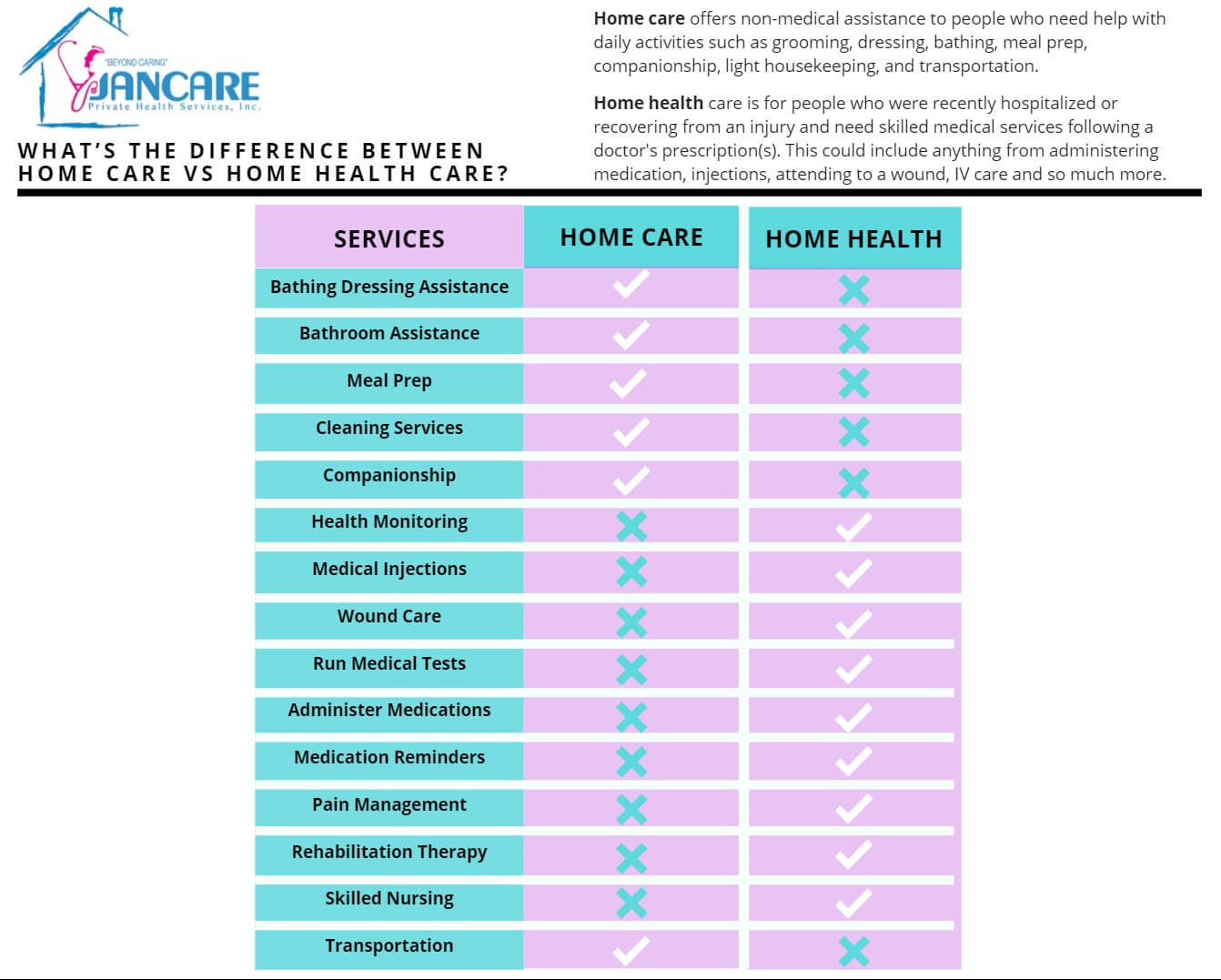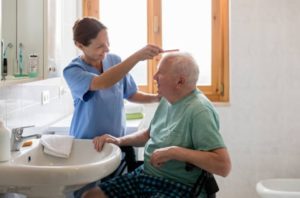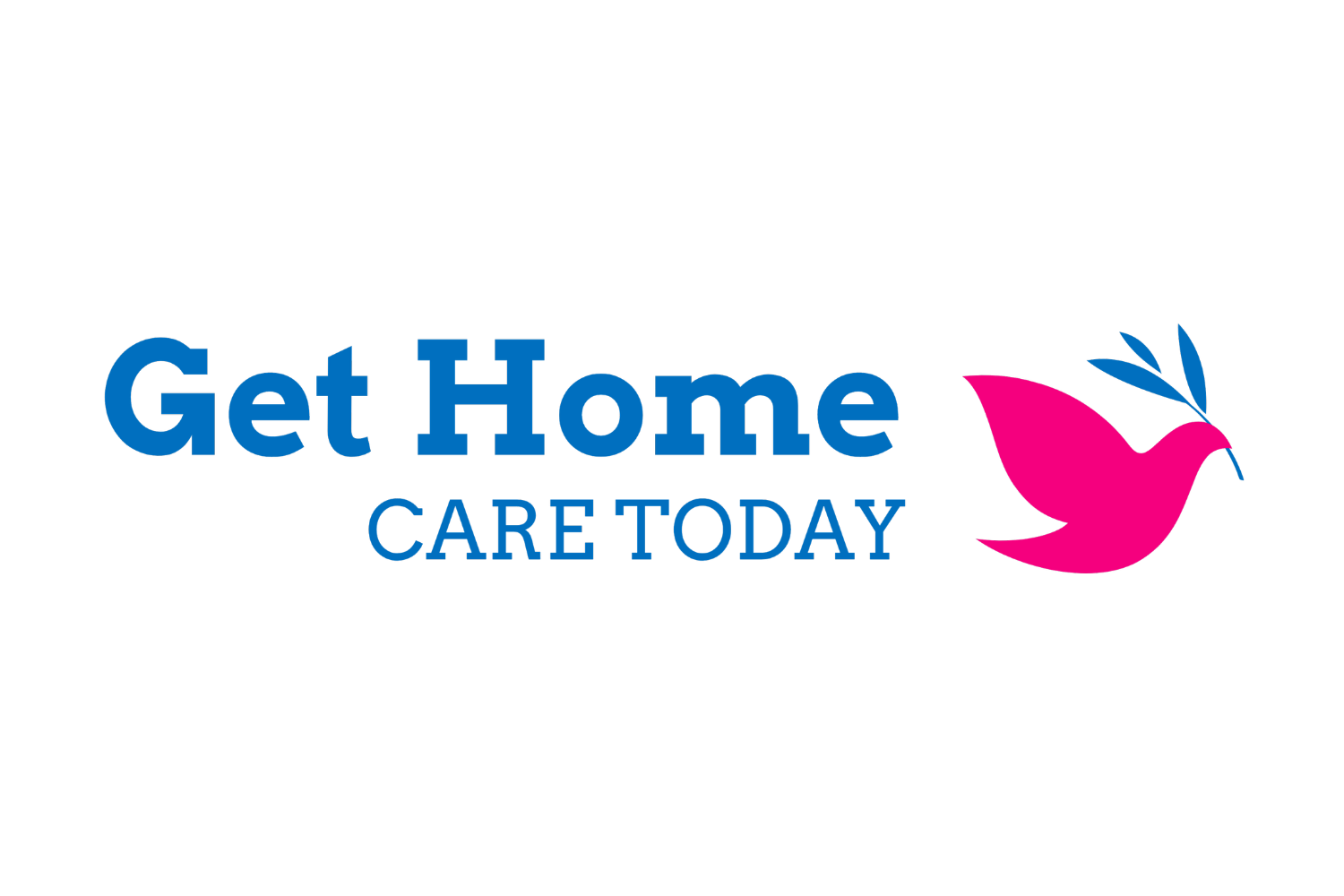When you think about “home care” and “home health care” you can easily mistake one for the other without knowing the key differences between them.
Home care offers non-medical assistance to people who need help with daily activities such as grooming, dressing, bathing, meal prep, companionship, light housekeeping, and transportation.
Home health care is for people who were recently hospitalized or recovering from an injury and need skilled medical services following a doctor’s prescription. That could include things like administering medication, injections, attending to a wound, IV care and so much more.
Not knowing what’s available to you or your loved one could be detrimental to their health and so here at JanCare we have created this resource to help you become more informed on the different types of care available to you.
Here’s a side by side comparison between both services to give you a better understanding.

To give you more of an in-depth breakdown between home care and home health care services we’ve put together an overview of what each offers and answer some of the most frequently asked questions.
What is Home Care?
This is a non-medical service that doesn’t require a written prescription by a doctor in order to get. Anyone who needs assistance performing daily activities to support themselves are encouraged to get this service to improve their quality of life.
This type of service can easily reduce the risk of things like injury, malnourishment, and depression from loneliness with the support of a caregiver also known as home care aides.
Home care aides are trained to understand the nuances of senior care, but are generally not licensed to provide medical services.
It’s important to note that home care services offers slightly different options in what they provide based on the state that you’re in so it’s important to ask what your local home care provider does or doesn’t do so that you’re aware of what you’re getting.
Types of home care services include:
Companionship

Companionship is one of the most frequently requested home care services. Even among those who enjoy living alone can get lonely, and that loneliness can intensify if you’re housebound. This is especially true for those who are restricted to a wheelchair or bedridden.
This service provides anything from attending social events together, playing cards, reading, listening to music, gardening, walking the dog, listening to stories, crafting and other activities desired by the client.
Medication Reminders
 Forgetting things is natural especially as you get older and sometimes you just need a friendly reminder to help you stay on track. While a home care aid cannot legally administer medications, only home health care plans can do that, they can remind seniors to take their medication as prescribed and can even call pharmacy’s to pick up medication refills.
Forgetting things is natural especially as you get older and sometimes you just need a friendly reminder to help you stay on track. While a home care aid cannot legally administer medications, only home health care plans can do that, they can remind seniors to take their medication as prescribed and can even call pharmacy’s to pick up medication refills.
General housekeeping
 It’s important to keep your home as clean and safe as possible to promote a healthy living environment in your home. Such tasks include anything from cleaning the house, watering plants, caring for pets, reorganizing closets or cabinets to be more accessible, changing sheets, doing laundry, and so much more!
It’s important to keep your home as clean and safe as possible to promote a healthy living environment in your home. Such tasks include anything from cleaning the house, watering plants, caring for pets, reorganizing closets or cabinets to be more accessible, changing sheets, doing laundry, and so much more!
General housekeeping services can also help to conserve the energy of seniors so that they have the energy and stamina to do more enjoyable activities and hobbies.
Food Shopping & Meal Prep
 It takes a lot of energy to get up to start cooking, especially when it’s for one person and the thought of prepping, cooking and cleaning up makes it feel even more daunting. If you consider the fact that seniors already have a hard time getting to the grocery store it’s no wonder why you see so many cases of malnourishment, bone density loss, weakening of muscles and joints in seniors who live alone or are not capable of preparing healthy meals.
It takes a lot of energy to get up to start cooking, especially when it’s for one person and the thought of prepping, cooking and cleaning up makes it feel even more daunting. If you consider the fact that seniors already have a hard time getting to the grocery store it’s no wonder why you see so many cases of malnourishment, bone density loss, weakening of muscles and joints in seniors who live alone or are not capable of preparing healthy meals.
Grocery and meal prep services help to ensure there is always healthy foods and snacks available, as well as delicious, easy-to-heat meals so seniors can have three square meals per day. Caregivers are happy to keep clients company while they eat to promote better appetites.
Basic Hygiene and Toileting
 Basic hygiene is oftentimes neglected for those who aren’t as mobile anymore and suffer from stiff joints making it harder to take regular showers, or even get dressed.
Basic hygiene is oftentimes neglected for those who aren’t as mobile anymore and suffer from stiff joints making it harder to take regular showers, or even get dressed.
With a caregiver, you’ll feel like you’re being pampered as you get bathed and dressed. Caregivers can also moisturize the body, style hair, trim and file nails so that seniors can feel like themselves again.
Transportation
 Being able to travel is important to continue living at home which is why we ensure you or your loved ones can safely travel to and from doctor appointments, shopping, medication pick-ups, and other errands. Home caregivers can perform all of these tasks.
Being able to travel is important to continue living at home which is why we ensure you or your loved ones can safely travel to and from doctor appointments, shopping, medication pick-ups, and other errands. Home caregivers can perform all of these tasks.
Here’s an example of someone who benefits from home care services.
Mary is an 85 year old woman who is homebound and doesn’t have the motivation to move around due to severe arthritis.
Mary does have a son who visits from time to time to do food shopping, cleanup around the house but can’t always make it because of work and other responsibilities.
Her son decided to Google search “home care near me” and called JanCare since they have stellar reviews and provide home care in Fishkill, NY where his mother resides.
And now everyday, Mary has what she calls a best friend who has frequent conversations with her, cooks, cooks, cleans, and even helps her bathe everyday!
How long does Home Care last?
Home care services can be provided hourly or daily and can continue to end of life. To determine the needs of any client a cooperative collaboration between the family and physician is done to provide the best options.
Fortunately, getting home care isn’t dependent on having insurance or getting a prescription and can be paid for out of pocket.
If you are in need of additional help, outside of standard home care, home health care services are available and can be set up to do things like preparing your medication box to administering any sort of injections or therapy.
How do I pay for Home Care?
Home care services are usually paid for out of pocket and in some instances you maybe qualified for assistance through governmental programs such as Medicaid.
It’s important to note that home care services are non-medical and isn’t covered by insurance unless it’s advised by a doctor under specific, temporary circumstances.
Your home care provider should be able to help you navigate all of your options during your initial consultation with them.
What is Home Health Care?
Home health care is provided under the supervision of a licensed professional to perform medical skilled services.
This type of service requires a written order from a doctor for someone who may be recovering from an injury or operation and needs extra support at home while they are recovering.
The people responsible for Home Health services are usually registered and licensed practical nurses, occupational therapists, and physical therapists through home health care agencies, or in some cases, hospice agencies.
This type of care is common for patients who are either home bound, coming home after hospitalization or rehab facility and are unable to perform the basic recovery recommendations prescribed by their doctor are the common cases requiring a licensed medical care provider.
A doctor’s referral allows the client to contract with a licensed home health care agency who will send out the appropriate caregiver, ranging from RNs, LVNs, CNAs and occupational or physical therapists.
Since such services are medical in nature, they are usually covered by Medicare, Medicaid and/or a private health insurance carrier, depending on the specifics of your case and the policy.
Types of Home Health Care services include:
Medical Case Management
 An RN is usually assigned as the medical case manager under the remote advisement of a physician or doctor. The case manager will check-in regularly to monitor the patient, read caregiver notes, make changes as necessary and discuss the case with the doctor to determine if further intervention or prescription(s) changes are needed.
An RN is usually assigned as the medical case manager under the remote advisement of a physician or doctor. The case manager will check-in regularly to monitor the patient, read caregiver notes, make changes as necessary and discuss the case with the doctor to determine if further intervention or prescription(s) changes are needed.
Under the RNs supervision, the other members of the health care team will provide medical care on a daily or multiple-days per week basis.
Based on the medical treatment provided, medical care may consist of anything from:
- Injections
- Medical tests
- Catheter care
- Pain Management
- Intravenous (IV) care
- Monitoring Health status
- Parenteral nutrition (PN)
- Administration of medications
- Patient and caregiver education
- Wound care and dressing changes
- Occupational and/or physical therapy
- Check blood pressure and sugar levels
- Medical equipment such as hospital bed, showering aids, oxygen, bedpans, etc.
This type of medical care at home model provides care that is equivalent to the level of care provided by a hospital or any other medical facility but costs less!
We love this model because studies show that home health care services make a significant difference in the reduction of hospital readmission rates.
With home health care, you could be the youngest person in the world but something like a surgical procedure may require you to get assistance until you can recover and take care of yourself.
This is great for individuals who would love to stay home as opposed to staying in the hospital after being discharged from rehabilitation, a hospital stay, or a skilled nursing facility.
Here’s an example of someone who benefits from home health care services:
Let’s say David, is a 70-year old man who enjoys his weekly visits from his home care provider that he’s had for over 2 years.
Due to David’s age, he needs to get knee replacement so he could continue fishing at his favorite spot in Dutchess Park lake but experiences a few complications after the procedure.
His doctor says that he’s okay to go home but prescribes home health care services to help him with his recovery plan and home care services to help with his day to activities.
Now that the doctor has prescribed both services, David’s home caregiver can now be covered by his insurance until the doctor says otherwise.
If David recovers enough and both his home care and home health services are no longer covered by his insurance, the medical care providers will phase out, while his home care provider will likely remain in place, paid for by David once again.
How long does home health last?
The skilled medical services offered by home health rarely exceeds two to three times a week and can be up to 8 hours per day.
It’s important to note that this service cannot be offered 24 hours a day but in some cases can be offered until end of life based on your medical evaluation. Home health is time sensitive except in some cases where neurological conditions can qualify for unlimited home health.
How do I pay for home health care?
Medicaid is usually the primary method of payment. Medicare can cover a few skilled services, but normally not more than one or two hours per day.
Can you Combine Home Care and Home Health Care services?
You can definitely combine them and in fact it’s oftentimes beneficial to do so.
It’s not uncommon for home care services to overlap with home health care services and in fact happens quite often.
Sometimes a person who had home health care services never fully recovers and ends up needing a long term home care plan to improve their quality of life.
Oftentimes families will find that a combination of home health care and home care is beneficial for their loved one.
Home health professionals are able to provide medical services, while caregivers can assist with everyday activities which delivers a perfect balance in the individual’s quality of life.
This approach helps to ensure that both the medical and emotional needs are all met.
Is living at home better or more affordable than senior homes?

Nursing homes are never recommended since there are home care services that can cater to your loved one as opposed to potentially being neglected.
As with any nursing home or long-term care facility there is a tremendous risk for elderly people of infection being surrounded by others with underlying medical conditions.
In fact according to a study from the University of Minnesota, they found that despite nursing homes having a controlled environment, they might account for 40% of Covid-19 deaths.
It’s even recommended by the CDC to have seniors stay in the safety of their homes as opposed to going out where the risk of infection is higher for older individuals.
General home care expenses are usually paid out of pocket and are overall less expensive than moving into an assisted living or nursing home community.
How to Get Started
I’ts important to note that based on the state that you’re in, both Home Care and Home Health services may vary on what they offer.
JanCare is located in New York state and can personally assist you with any of your home care or home health needs.
We like to make it easy to get things started and in some cases we could even get you started next day!
So ask yourself why wait?
You’ve probably been doing searches for “home care near me” or “home care in Dutchess County” looking for an agency that can deliver the quality service your loved one deserves.
We pride ourselves on delivering service with caring hands and can’t wait to do the same for you!
Contact Us Today! And learn what we could do for you or your loved one.


Wow, wonderful blog layout! How long have you been blogging for? you make blogging look easy. The overall look of your website is magnificent, let alone the content!